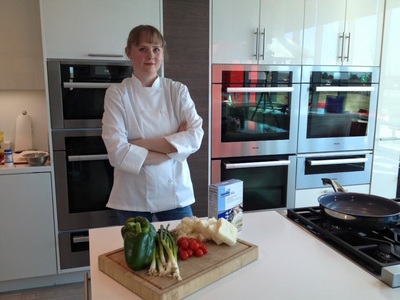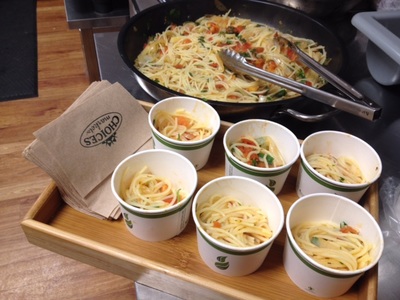|
In spring 2016, Maria Depenweiller led a series of culinary master classes across Canada for a unique audience. Two companies that manufacture specialty medical foods organized low protein cooking demonstrations in order to help families with individuals who have inherited metabolic disorders to learn how to cook gourmet and simple dishes at home. Maria used low protein baking mixes and pastas to create full menu of low protein dishes and showcased her work in Vancouver, Toronto and Ottawa.
As part of activity of her consulting business The Wooden Spoon (www.thewoodenspoon.ca) Maria focused on lack of communication between companies who manufacture the specialty foods, dietitians and the patients. Dietitians gave prescriptions and dietary advise, manufacturers provided the specialty foods but no one was available to demonstrate how these foods were supposed to be prepared. As most patients with inherited metabolic disorders were diagnosed in early childhood, cooking up a low protein meal was a puzzling task for mothers. A Professional Home Economist turned out to be the perfect fit to fill the gap between patients, food manufacturers and dietitians who closely follow their patients and adjust their dietary needs throughout their lifespan. Maria’s culinary demonstrations helped the patients to learn essential cooking skills, required to cook healthy home meals that fit their highly restrictive diets and provided useful tips on various uses of the specialty foods. According to the feedback the culinary events were a great success and were much appreciated by all – the organizers, the patients as well as the dietitians. Another round of similar events is expected for next year. Maria Depenweiller, P.H.Ec.
2 Comments
The Farm and Food Care spring media tour took place on June 8th at Gwillimdale Farms, and many of our OHEA members were there! Thank you to Barb Holland, P.H.Ec, Pat Moynihan-Morris, P.H.Ec, Teresa Makarewicz, P.H.Ec, Olga Kaminskyj, P.H.Ec, Bridget Wilson, P.H.Ec for sharing these photos. It’s a fact! Canadians waste food – especially fresh produce. With careful planning, and proper storage, families can save money and time and always have nutritious produce on hand for quick and healthful meals.
Tips to Reduce Waste, Save Money and Enjoy More Produce
This flavourful, nutrient-packed soup served with a thick slice of whole grain bread is sure to satisfy. 8 cups (2 L) ‘low-sodium’ chicken or vegetable broth 2 large baking or yellow-fleshed potatoes, peeled and diced (about 3 cups/750 mL) 2 leeks, white and light green parts only, thinly sliced 2 cups (500 mL) thinly sliced green cabbage 2 cups (500 mL) small cauliflower florets 3 carrots, sliced 2 stalks celery, sliced 1 bay leaf 1 can (19 oz/540 mL) white kidney beans, drained and rinsed 1/3 cup (75 mL) each, chopped fresh dill and fresh parsley 1/4 tsp (1 mL) freshly ground pepper Salt to taste In a large pot, combine broth, potatoes and leeks. Cover and bring to boil over high heat. Add cabbage, cauliflower, carrots, celery and bay leaf. Cover and return to boil. Reduce heat to medium-low. Simmer gently for 20 minutes or until vegetables are tender-crisp. Add beans, dill, parsley, pepper and salt to taste. Simmer, uncovered for 10 minutes or until beans are heated through. Remove bay leaf and serve. To store, let cool for 30 minutes; refrigerate, uncovered, in a shallow container until cold. Cover and refrigerate for up to 3 days. Reheat slowly. Makes 8 -10 servings. Helpful Hints: Substitute kidney beans with 2 cups (500 mL) frozen lima beans. Fresh herbs are a must in this recipe and can be increased to suit your taste. No leeks? No worries. Use 1 cup (250 mL) chopped shallots or cooking onion. Teresa Makarewicz, P.H.Ec. is an Ancaster-based Professional Home Economist and owner of Foodgroups Consulting. An expert in recipe development, testing, food styling and media presentations, Teresa has focused much of her food and nutrition career teaching consumers how to use local produce. She is a member of the Ontario Home Economics Association My name is Juliana VanderMey. From my last name you have probably already guessed I am of Dutch descent. I grew up in the city of Mississauga, Ontario and moved to London, Ontario to pursue a degree in Foods and Nutrition at Brescia University College, affiliate of Western University. I have recently graduated with a BScFN Honours Specialization in Nutrition and Dietetics and a Minor in Psychology. Throughout my degree I have taken advantage of many opportunities in the Foods and Nutrition field. One of my greatest achievements was working on a research project with Dr. Latifeh Ahmadi. Our research on Flixweed Oil was accepted for presentation at the 2015 American Oil Chemist's Society Annual Summit. I will be returning to Brescia to pursue a Professional Diploma in Dietetic Education and Practical Training in May of 2017 to pursue my dream of becoming a Registered Dietitian. Upon graduating from this degree, I hope to get into nutrition education to help increase awareness on various nutrition issues and the policies and guidelines associated with them.
My passions are not just limited to nutrition. In Mississauga I was very involved in music, playing Piano for 14 years and Baritone and Trombone for 4 years. This passion for music got me involved in Western's Marching Band as a Trombonist. Outside of school I am an avid budgie breeder, having raised around 20 chicks since starting off. Coincidentally, my nutrition degree came in handy with this as a breeding hen and her chicks require specific diets for optimal health and growth. Overall, I am a very proud alumni of Brescia, and am honoured to be accepted into the Ontario Home Economics Association. I hope to do great things with not only the RD designation, but also the PHEc designation. Thanks, Juliana VanderMey Tips and Tricks to Help Stretch Grocery Dollars
• Take 10 minutes to plan dinners for the week. Include lots of variety. It is one of the best ways to ensure you place healthy meals on the table. Make a shopping list and stick to it. You will not be as tempted to make impulsive or unnecessary purchases. Buy specials whenever possible. Use coupons to purchase only products that you really need. • Meat and seafood are often the most expensive items in your shopping cart, so choose recipes that extend either of them in pasta dishes, risottos, soups and stews. • Add whole wheat bread crumbs or oatmeal to ground meat, or place roasted root vegetables around a lean pot roast, to extend the number of servings. • Be aware of the cost per serving, not just the total package price. Depending on the price per kilogram, lean boneless meat might be less expensive than meat with ‘bone in’. There is less waste! One serving of meat, fish or poultry should weigh 50–100 grams, roughly 2-3 1/2 ounces – about the size of a deck of cards. • Slow cooking tenderizes less expensive cuts of meat such as beef brisket, stewing beef and pork shoulder roasts. The lengthy cooking time in a slow cooker (which uses less electricity than an oven) tenderizes meat and allows flavours to blend. • Buy meat in ‘family packs’, which are often priced less per kilogram. Separate, wrap well in freezer paper or bags, and freeze in quantities that suit your family’s needs. • Vegetarian meals are often budget-wise. Choose recipes that include kidney beans, lentils, chick peas or eggs to provide protein at a fraction of the cost of meat. • Stock a budget-smart pantry and freezer. Items such as pasta, canned tuna or salmon and a variety of frozen vegetables are handy staples. To save money, buy the large size of products that keep well, such as rice, if you have a place to store them. • Fruits and vegetables are usually more affordable ‘in season’. But not always! Check weekly specials. Ontario grown carrots, cabbage, onions, beets, parsnips and apples from storage are usually affordable year-round. Ontario greenhouses provide tomatoes, cucumbers and lettuce of excellent quality all winter. Check out road-side stands and Ontario farmers’ markets for fresh and affordable produce in season. • Buy a large can of tomato paste and measure what you aren’t using immediately into ice cube trays. When frozen, un-mold and store in a plastic bag. Each cube holds approximately 1 tablespoon (15 mL) for adding to soups, stews and other recipes. • Don’t let fresh herbs wilt in your refrigerator. Wash and chop them before packing lightly into small plastic storage containers. Store in freezer until needed to add to various dishes where herbs are cooked. • Avoid food waste. Buy the quantities that you need to feed your family and keep tabs on what’s in the fridge! Take refrigerator inventory often. Keep a list of leftovers on the fridge door to remind you to use them up in soups or stews to avoid spoilage. • Stock up on high fibre, protein and complex carbohydrate-rich canned legumes, such as chick peas, to affordably ‘boost up’ salads, pasta dishes, soups and stews. • Double up when making your favourite pasta sauce, chicken stew or chili and recycle them into a second meal, such as pizza, chicken pot pie with a biscuit crust or Sloppy Joes, to save time. • Make soup. Start with leftovers and toss in your favourite veggies, pasta, and legumes and serve it with whole grain rolls or toast for a healthy, hearty and affordable meal. • Be aware of how much you actually spend on food by keeping track of all purchases for a week or two. Remember not to confuse the cost of magazines, sundries and other miscellaneous items as part of the ‘food’ total. • Always cover foods while they are cooking in the microwave. This reduces both cooking time and nutrient loss, which makes the final product a better value. |
The Ontario Home Economics Association, a self-regulating body of professional Home Economists, promotes high professional standards among its members so that they may assist families and individuals to achieve and maintain a desirable quality of life. Categories
All
Archives
April 2024
|
|
Subscribe to our mailing list
|
|
Unsubscribe from our mailing list
|
Copyright © 2023 Ontario Home Economics Association (OHEA). All Rights Reserved.





 RSS Feed
RSS Feed